Search Results
Showing results 81 to 100 of 185

Decoding Machine
Source Institutions
In this math lesson, learners explore variables and their uses.

Slimy Cells
Source Institutions
In this activity, learners solidify their conceptualization of cells by building a model of a cell in a ziplock bag.
Race to the Dollar
Source Institutions
In this math activity, learners play a card game to practice adding coins quickly, just like a banker. First, learners create coin cards. Next, the cards are dealt to each player.
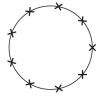
Circle Logic
Source Institutions
This is a deceptively simple game to teach strategy, planning, and pattern analysis. In this game, learners take turns removing tokens from a board, and develop a plan to take the last piece.
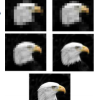
Patterns in Pixels
Source Institutions
This activity (page 2) draws upon a familiar, computer-based concept related to visual resolution: pixilation.

Four-Sock Drawers
Source Institutions
These puzzles use four colors of socks in a drawer to get learners thinking algebraically.

Using Ohm's Law to Build a Voltage Divider
Source Institutions
In this activity, learners apply Ohm’s Law to construct voltage divider circuits. Learners discover how to read resistor codes and calculate resistor values.
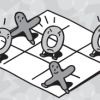
Toe-Tac-Tic
Source Institutions
In this activity, learners play a game similar to Tic-Tac-Toe. In this version, learners try NOT to get three-in-a-row. The player who gets three-in-a-row first loses!

Everything Grows
Source Institutions
In this activity, learners explore patterns and sequences as they observe fictional plant growth.
Many Seeds: Estimating Hidden Seeds
Source Institutions
In this activity, learners will estimate how many seeds are in a fruit or vegetable, then count to find out. The result: mix estimation with healthy eating.

Sumo
Source Institutions
In this version of a Sumo wrestling bout, players use mathematical skills to move their opponent's counter beyond the track and "out of the ring." Learners reveal playing cards and the player with the
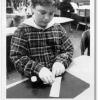
Cylinders and Scale
Source Institutions
In this activity, learners investigate the relative growth of lengths, areas, and volumes as cylinders are scaled up.

Shower Estimation
Source Institutions
In this activity, learners calculate their water usage (in cups and galloons) during an average shower. Learners also chart and analyze water usage during showers in their households.
Narrow It Down: Asking Yes-No Questions
Source Institutions
In this activity, the learner asks yes-no questions to identify a secret object (similar to Twenty Questions). This game is easy to adapt for different ages and different kinds of contexts.
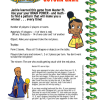
Gotcha Game
Source Institutions
In this Cyberchase activity, learners play a simple game using 15 paper dragons (or any 15 objects). One of the 15 dragons is red. Learners try to make their opponent take the red piece.
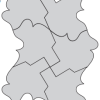
Exploring Tessellations (Grades 6-8)
Source Institutions
In this activity, learners design unique tiles and make repeating patterns to create tessellations. This activity combines the creativity of an art project with the challenge of solving a puzzle.
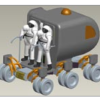
Cooling Off
Source Institutions
In this activity, learners are introduced to challenges of maintaining temperatures while living in space.

Solar Water Heater
Learners work in teams to design and build solar water heating devices that mimic those used in residences to capture energy in the form of solar radiation and convert it to thermal energy.
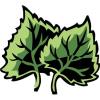
Determining the Amount of Transpiration from a Schoolyard Tree
Source Institutions
In this activity, learners calculate the number of milliliters of water a nearby tree transpires per day.
Counting Books: Make Your Own!
Source Institutions
On the first night, I saw 5 stars in the desert. On the second night, I saw 10… What do you think I saw on the third night? Combine arts and crafts, literacy, and math by making a counting book.
